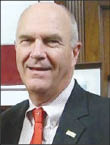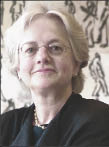 |
|
Laura Robinson |
Government
The “Yes We Can” attitude at President Obama’s Justice Department must have resonated with Laurie Robinson.
The Clinton-era assistant attorney general for the Office of Justice Programs was on Obama’s transition team for the office, and agreed to serve as acting leader while the administration searched for a permanent choice. But she made it clear to JJ Today that she had no intention of staying.
“I did it for SEVEN years!” Robinson told Youth Today in an e-mail in January, when asked if she had some desire to give the federal life another go-round. “Seriously, no. I’ve been there and done that. I’ll be helping find someone to do it. Thought I could help out until someone comes in.”
Time has changed her mind; last month, Obama announced his intention to nominate her for the job.
“It’s an important time, with OJP charged with giving out nearly $3 billion in Recovery Act funds,” said Robinson, when asked what made her reconsider. Plus, she said, Attorney General Eric Holder “can be a very persuasive person.”
During her first stint at OJP, from 1993 to 2000, the agency ballooned from an annual appropriation of $800 million to $4 billion. OJP includes several youth-relevant offices: the Office of Juvenile Justice and Delinquency Prevention (OJJDP), the Bureau of Justice Assistance and the Bureau of Justice Statistics. (Nobody has been nominated to fill the top posts at those offices.)
Robinson drew the ire of some juvenile justice leaders during the restructuring of OJP during her first tenure. The shake-up included a consolidation of OJP research, which eliminated research operations at OJJDP and moved it over to the National Institute of Justice (NIJ).
“For many years, some old heads in criminology wanted to put it all within NIJ,” said Buddy Howell, a former OJJDP research director, who was with the office for 21 years. “She just listened to that narrow group of folks” on consolidation.
The debate ended in a draw of sorts: OJJDP continued to conceive research projects, while Robinson farmed out the legwork on projects to NIJ. When the Bush administration came in, all of the research responsibility moved over to NIJ.
At the time the consolidation efforts began, OJJDP had a solid reputation for integrating research and program development, Howell said. “I can’t name any examples of where NIJ research has fed directly into programs,” he said.
Before working for Obama, Robinson was at the University of Pennsylvania, most recently as director of the school’s Master of Science program in Criminology. Before joining the Clinton administration, Robinson led the American Bar Association’s criminal justice programs for 14 years. Contact: (202) 307-0627, http://www.ojp.usdoj.gov.
Carmen Nazario, a former Clinton administration official with the Administration for Children and Families (ACF), has been nominated to lead the agency for the Obama administration.
ACF, part of the U.S. Department of Health and Human Services (HHS), is one of the largest youth-serving agencies in the federal government. It distributes foster care money to states and oversees the Office of Head Start and the Family and Youth Services Bureau, which quadrupled in size during the Bush administration and now has a budget of around $350 million.
Nazario’s experience with family-serving agencies is diverse. She cut her executive teeth running social services in Norfolk, Va., and Loudoun County, Va., then served as Delaware’s secretary of health and social services.
“She was competent and hard-working,” recalls Tom Eichler, who preceded Nazario in the Delaware post before leading the Delaware Department of Services for Children, Youth and Their Families.
“She did a lot around welfare reform – things that impacted greatly around children – and developed a fine national reputation.”
After her stint with Clinton, Nazario took a job with the Jordan Poverty Alleviation Program, a USAID-funded project to help Jordan develop a social service system. From 2003 to 2008, she ran Puerto Rico’s Administration for Children and Families, which has a staff of 4,000.
The last permanent assistant secretary for children and families was Wade Horn, who left the Bush administration in April 2007. The agency, which oversees programs dealing with such areas as foster care, homeless youth, unaccompanied minors and child support enforcement, is usually provided a budget just south of $50 billion. Contact: (202) 690-6343, http://www.acf.hhs.gov.
Education Secretary Arne Duncan welcomed financial aid expert Robert Shireman to his team in a more permanent way in late April.
Shireman was on the Obama transition team for the Department of Education, then was hired as a part-time consultant for Duncan to help oversee things while Duncan hired staff.
Now he’s become a part of the leadership, having been nominated to serve as Duncan’s deputy undersecretary. The department’s website says Shireman will “advise the department on college financial issues and other higher education initiatives.”
Shireman emerged as a leader on access to college for low-income students while serving as the first legislative director for the late Sen. Paul Simon (D-Ill.), pioneering an overhaul of the federal student loan program. He then served as an education adviser to President Clinton.
Shireman was an early and vehement voice for shifting from banks to direct government lending on student loans, which is the strategy Obama intends to employ.
After stints with the James Irvine Foundation, a California grant maker, and the Aspen Institute, Shireman founded the Institute for College Access and Success, which advocates making higher education more affordable.
Also likely to join Duncan is John Q. Easton, executive director of the Consortium on Chicago School Research, who has been nominated to be director of the Institute of Education Sciences (IES) at the Department of Education. Easton and the consortium, which is housed at the University of Chicago, had a close relationship with Duncan when he was CEO of Chicago Public Schools. Easton served two stints as director of research, analysis and assessment for Chicago Public Schools, from 1994 to 1997 and from 2001 to 2002.
IES funds research on academic achievement and evaluates related federal programs. Last summer, it released a report titled Enhanced Academic Instruction in After-School Programs. Contact: (800) 872-5327, http://www.ed.gov.
David Myers will head the Center for Faith-Based and Community Initiatives at the Department of Homeland Security (DHS). For the past decade, Myers has been executive director of Teen Living Programs, which provides housing and services to Chicago-area youth. It is the grantee for the federal Transitional Living Program overseen by the Family and Youth Services Bureau (FYSB).
Myers holds a master’s of divinity degree from Goshen Biblical Seminary in Indiana, and serves on the boards of the Chicago-based Youth Network Council and the Illinois Collaboration on Youth.
Myers inherits what was a relatively dormant corner of the faith-based initiative under former President George W. Bush. A search of the DHS website produces only a 2007 privacy impact assessment for the center’s Web portal. Youth Today could not find that portal through any conventional means. Contact: (202) 282-8000, http://www.dhs.gov.
Obama’s choice for drug czar, R. Gil Kerlikowske, has been confirmed by the Senate to lead the White House Office of National Drug Control Policy. Kerlikowske, Seattle’s former police chief, inherits a staff of about 100 and a budget of approximately $440 million. Two of the office’s larger operations are its oft-debated media campaign ($70 million) and the Drug-Free Communities program ($90 million, with 769 grantees in 2008).
Ed Jurith, who was acting director, will return to his post as general counsel, where he has been since 1994. Contact: (202) 395-6618, http://www.whitehousedrugpolicy.gov.
Chuck Hurley, who is still the CEO of Irving, Texas-based Mothers Against Drunk Driving (MADD), appeared to be on a path toward Washington to run the National Highway Traffic Safety Administration (NHTSA). But his candidacy for the job was derailed by criticism from environmentalists about his stance on fuel economy standards.
 |
|
Charles Hurley |
Hurley demonstrated “hostility to fuel economy standards,” said Dan Becker, director of the Washington, D.C.-based Safe Climate Campaign. “That is half of what NHTSA does.”
In the early 1990s, before he became a prominent advocate on safety matters, Hurley lobbied against existing fuel standards as vice president of the Insurance Institute for Highway Safety. Hurley told the news media he was concerned about fuel standards leading to a downsizing of vehicles, which he believed would increase the likelihood of fatalities and serious injuries during accidents.
Hurley’s nomination to NHTSA never became official. Contact: MADD (800) 438-6233, http://www.madd.org; NHTSA (888) 327-4236, http://www.nhtsa.gov.
Nonprofits
The National Head Start Association (NHSA) has a new executive director. Yasmina Vinci goes to the Alexandria, Va.-based organization by way of
 |
|
Yasmina Vinci |
Boston, where she founded and led EDGE Consulting Partners. Vinci takes over from Michael McGrady, the interim executive director for the past 17 months. Vinci’s past experience also includes 11 years as executive director of the National Association of Child Care Resource and Referral Agencies.
The nonprofit NHSA, representing more than one million children, 200,000 staff members and 2,600 head start programs, provides training, research and other services to help Head Start children and their families. Contact: (703) 739-0875, http://www.nhsa.org.
The D.C.-based Children’s Defense Fund (CDF) brought on Cathy Grace to serve as its director of early childhood development policy. Grace most recently was a professor at Mississippi State University’s college of education, and directed the university’s Early Childhood Institute and National Center for Rural Early Childhood Learning Initiatives.
The nonprofit CDF works to advance policies that take children out of poverty, protect them from abuse and neglect, improve their health care status and other services. It posted operating assets of $23.6 million and an endowment of $32.1 million in its most recent financial report. Contact: (800) 233-1200, http://www.childrensdefense.org.
The Urban Institute has extended Senior Fellow Susan Popkin’s purview. She will now be director of its new program on neighborhoods and youth development.
Popkin joined the Urban Institute – a Washington-based social and economic policy research group – in 1998 as a senior fellow in the institute’s Metropolitan Housing and Communities Policy Center. She will maintain that role as well.
Popkin has researched the effects of federal policy on public- and assisted-housing families, and was the lead author of The Hidden War: Crime and the Tragedy of Public Housing in Chicago. She received a doctorate in human development and social policy from Northwestern University.
The Urban Institute’s program on neighborhoods and youth development will focus on the relationship between youths’ personal situations, including family and education, and their surrounding neighborhoods. The program aims to conduct longitudinal studies. Contact: (202) 833-7200, http://www.urban.org.
Linda Juszczak, co-founder of the National Assembly on School-Based Health Care (NASBHC), is the organization’s new executive director. She had been serving as acting executive director of the nonprofit advocacy and support organization, which she started in 1995. She previously served as deputy director.
Juszczak has also worked as a nurse practitioner in New York and directed hospital, community and school-based adolescent programs, including serving as the founding president of the New York State Coalition for School-Based Primary Care. A continuing practitioner as a pediatric nurse in adolescent medicine, Juszczak has been a faculty member at Yale University, Cornell University and New York University.
The Washington-based NASBHC, with a staff of 10, organizes the efforts of 1,700 school-based health centers and works with its 20 state affiliate chapters to develop policy changes on the federal, state and local levels. Contact: (202) 638-5872, http://www.nasbhc.org.
Foundations
The New York-based Clark Foundation has named Douglas B. Bauer as its new CEO. Bauer most recently served as senior vice president of Rockefeller Philanthropy Advisors, and previously was vice president of Goldman Sachs’ strategic wealth advisory team and president of Goldman Sachs Philanthropy Fund.
Founded in 1931, Clark is a private family foundation that supports New York nonprofits through grants and operating programs. The foundation would not disclose current asset estimates; it listed $488 million in 2008. Contact: (212) 977-6900.
The California Endowment (assets: $3 billion) has elected former Ford
 |
|
Susan Berresford |
Foundation President Susan Berresford to its board of directors. The endowment, based in Los Angeles, is a private statewide health foundation that works to expand health care coverage for underserved populations. Contact: (800) 449-4149, http://www.calendow.org.
Yazeed Moore has been promoted to program officer at the Flint, Mich.-based Charles Stewart Mott Foundation (assets: $2 billion). Moore started as an intern with the foundation in 2002 and was quickly brought on as a program assistant for the Pathways Out of Poverty portfolio, which among other things funds efforts to give vulnerable youth access to educational opportunities.
Moore has been managing the at-risk youth portfolio – which includes grantees such as the American Youth Policy Forum, Philadelphia Youth Network and Michigan’s Children – with the help of Program Officer Jack Ligzenberg. He will now have complete control over the portfolio. He has also overseen a grant to Youth Today. Contact: (810) 238-5651, http://www.mott.org.
Crime
Sharon Martin, the former finance director at the D.C.-based National Children’s Alliance, has pleaded guilty to stealing eight payroll checks. The checks totaled $15,800.
Lydia Hemmings, the wife of Hawaii State Sen. Fred Hemmings (R), has been indicted on charges that she stole money from her own youth-related nonprofit – Blueprint for Change, which works to improve child welfare in Hawaii.
Efrain Gonzalez, a former New York state senator, pleaded guilty to funneling $200,000 in state funding to two nonprofits – the West Bronx Neighborhood Association and the United Latin American Foundation – that he used to pay off personal credit card bills. Gonzalez faces up to nine years in prison.
Al Zimmerman, the former spokesman for the Florida Department of Children and Families, has been sentenced to 24 years in prison. Zimmerman pleaded guilty in January to producing and selling child pornography. One of his subjects was a foster child.
























